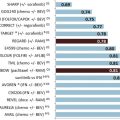The outcome of patients with locally advanced, resectable gastric cancer, or adenocarcinoma of the gastroesophageal junction is poor. In clinical trials, multimodality therapy, such as perioperative chemotherapy, preoperative or postoperative chemoradiation, or adjuvant chemotherapy led to significant increments in survival. Therefore, experts agree that patients with stage II or III disease should be offered a multidisciplinary treatment approach. However, patients are treated somewhat differently in the different regions of the world and survival rates remain far from being satisfactory. Efforts to further improve outcome are highly warranted.
Key points
- •
Available data indicate that patients with clinical stage II or III adenocarcinoma of stomach, gastroesophageal junction (GEJ), and esophagus benefit from multimodality treatment approaches.
- •
Therapy options for western patients include perioperative chemotherapy for both gastric and GEJ cancer, postoperative chemoradiation for gastric cancer, and preoperative chemoradiation for esophageal adenocarcinoma.
- •
In terms of perioperative chemotherapy protocols, platinum-fluoropyrimidine doublets, such as cisplatin and 5-fluorouracil (5-FU) (CF); triplets, such as epirubicin, cisplatin, and capecitabine (ECX); or docetaxel, 5-FU, leucovorin, oxaliplatin, and docetaxel (FLOT) are appropriate regimens.
- •
Current studies still do not recommend a preferred chemotherapy regimen but rates of complete pathologic remission differ among the regimens and are approximately at 2% with CF, 7% with ECX, and 16% with FLOT.
- •
Adding postoperative radiotherapy to established perioperative or adjuvant protocols did not improve survival.
- •
Future studies will focus on evaluating the role of biologic agents such as trastuzumab and pertuzumab (for HER2-positive disease), or ramucirumab, as well as immunomodulatory antibodies, such as programmed death (PD)-1 or programmed death-ligand (PD-L1) antibodies.
Stay updated, free articles. Join our Telegram channel

Full access? Get Clinical Tree





